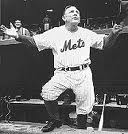Amazin: The Larger the Reward the Poorer the Performance
 I grew up on Long Island along with a baseball team named the New York Metropolitans. They were managed by the legendary Casey Stengel who was one of those special individuals who spoke his own language: Stengelese. Woeful performance after woeful performance, Casey would shake his head and describe his team’s play as simply Amazin’. The New York Metropolitans came to be known as the Amazin’ Mets, or sometimes just the Amazins.
I grew up on Long Island along with a baseball team named the New York Metropolitans. They were managed by the legendary Casey Stengel who was one of those special individuals who spoke his own language: Stengelese. Woeful performance after woeful performance, Casey would shake his head and describe his team’s play as simply Amazin’. The New York Metropolitans came to be known as the Amazin’ Mets, or sometimes just the Amazins.
Well, here is something else that is nothing short of Amazin’. Tangible extrinsic rewards like bonuses or commissions, do not work when you need smart behaviors. In fact, research shows that the larger the monetary reward, the poorer the performance. This may sound counter intuitive. But, it is based in rigorous science and the findings have been replicated many times.
To qualify this point, financial incentives are fine if you need physical tasks performed harder or faster. But when the tasks are cognitive, cash incentives have an inverse impact on performance. Prominent psychologist, and principal contributor to this body of research, Edward Deci, theorizes that when intellectual work is controlled by an extrinsic reward, a sense of autonomy is undermined and that behavior is thwarted.
This research is captured by Daniel Pink, author of A Whole New Mind, in this ten minute video: http://www.youtube.com/watch?v=u6XAPnuFjJc
Yes, if Casey Stengel1 were alive today, he would surely label the fact that most sales organizations use rewards that do not work as truly Amazin’. To motivate smart behaviors businesses need to use intrinsic rewards that appeal to inherent human needs to be competent in what they do; to have autonomy to do it; and to have good relationships with leaders and co-workers. What is even more Amazin’, is that intrinsic rewards, not only work, they are free.
If any of you have an appetite to delve more deeply into the Amazin research that supports this post, please let me know. By the way, the New York Metropolitans are having yet another Amazin season trailing the league leaders by 23 games.
1 For readers who would like Casey’s insight into being a successful manager, here it is: “The secret to successful management is keeping the guys who hate you away from those who are undecided.”

Amazing, indeed! But I wonder how Pink (and Alfie Kohn) would explain the singular focus of most investment bankers, hedge fund managers, and private equity specialists on financial rewards, even in the post-crisis era. In those rarified worlds, money is the primary way of keeping score, not just institutionally but personally. Pink’s comment that you have to pay people just enough to get them to move beyond a pre-occupation with money raises the question, “How much is enough?” I am reminded of a comment attributed to author Joseph Heller. While attending an over-the-top party thrown by a hedge fund manager in The Hamptons, Heller was asked by a colleague, “How does it make you fell to know that this guy makes more money in one day than you’ve made on all your books?” Heller replied, “Maybe, but I’ve got one thing he’ll never have – enough.”